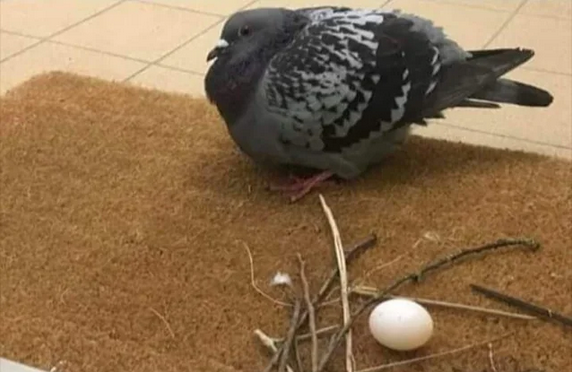Did you know they're NOT wild?
Humans used to breed them for delivering messages and meat, it got to a point they're reproducing up to 9 times per year. Eventually humans threw them out since there were better alternatives.
City pigeons live in cities all over the world. But city pigeons also occur outside of cities, especially in areas modified by humans. As a descendant of the rock pigeon, whose habitat is rocky coasts and caves, the city pigeon is unable to breed in trees. It relies on houses, walls, bridges, etc. as rock replacements. Big skill for a bird, they don't have to be great nest builders, they use whatever is already there.

FLYING RAAAATS! DISEASEEEES! ...right??
No. City pigeons transmit just as many or fewer diseases as blackbirds, dogs or cats. If you pay attention closely, you might notice this rumour is coming from services in pigeon defense/disposal and professional pigeon droppings cleaning (in better terms, they make money with this). And so it happened that people just repeat since generations.
While I understand the annoyance of dirty places, we shouldn't blame city pigeons for it. Instead, we should feed them to form more washable poop: If they only barely eat healthy (which is common in cities), they mostly only produce urine which is the white spots as you all would recognize. Good looking poop would be a little ball of green and white and it would wash away whenever it rains.
Conclusion: It's humans fault, as always. If you asked me on a more personal level, I would highly criticize the pigeon race sports worldwide. For a race, they separate a couple and primarily make use of the male bird, since it wants to rush home as soon as possible for partner bird and babies. 70% don't make it back home. You can guess what happens to them, it's 2 things.
And as someone who used to be a (wild) bird rehabber and also taking care of city pigeons, as well as weak and injured race pigeons, it's not just males. People do everything for money, and even send the females and younglings of only a few months old who are just able to fly.
Finding a city pigeon in need is not something unusual, and when you do, take it home, you don't need anything else than your hands. Put it in a box with soft cloths, put some warmth into it, contact a local animal rehabilitation Correct those around you, we all can just learn.
Correct those around you, we all can just learn.
Humans used to breed them for delivering messages and meat, it got to a point they're reproducing up to 9 times per year. Eventually humans threw them out since there were better alternatives.
City pigeons live in cities all over the world. But city pigeons also occur outside of cities, especially in areas modified by humans. As a descendant of the rock pigeon, whose habitat is rocky coasts and caves, the city pigeon is unable to breed in trees. It relies on houses, walls, bridges, etc. as rock replacements. Big skill for a bird, they don't have to be great nest builders, they use whatever is already there.
FLYING RAAAATS! DISEASEEEES! ...right??
No. City pigeons transmit just as many or fewer diseases as blackbirds, dogs or cats. If you pay attention closely, you might notice this rumour is coming from services in pigeon defense/disposal and professional pigeon droppings cleaning (in better terms, they make money with this). And so it happened that people just repeat since generations.
While I understand the annoyance of dirty places, we shouldn't blame city pigeons for it. Instead, we should feed them to form more washable poop: If they only barely eat healthy (which is common in cities), they mostly only produce urine which is the white spots as you all would recognize. Good looking poop would be a little ball of green and white and it would wash away whenever it rains.
Conclusion: It's humans fault, as always. If you asked me on a more personal level, I would highly criticize the pigeon race sports worldwide. For a race, they separate a couple and primarily make use of the male bird, since it wants to rush home as soon as possible for partner bird and babies. 70% don't make it back home. You can guess what happens to them, it's 2 things.
And as someone who used to be a (wild) bird rehabber and also taking care of city pigeons, as well as weak and injured race pigeons, it's not just males. People do everything for money, and even send the females and younglings of only a few months old who are just able to fly.
Finding a city pigeon in need is not something unusual, and when you do, take it home, you don't need anything else than your hands. Put it in a box with soft cloths, put some warmth into it, contact a local animal rehabilitation
 Correct those around you, we all can just learn.
Correct those around you, we all can just learn.